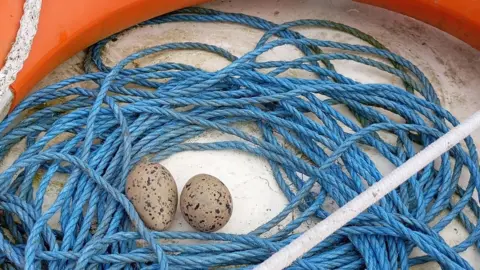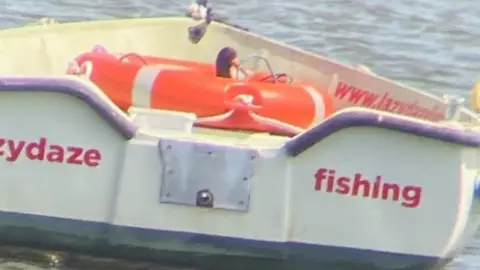Oystercatcher nests on board New Forest nature tour boat
 Wild New Forest
Wild New ForestA nature spotters group was taken by surprise when a wading bird was found to have nested on its tour boat.
Conservation group Wild New Forest said the oystercatcher had laid two eggs on the canopy of a boat due to embark its river cruise on the Beaulieu River.
Tour leader Marcus Ward said it was a "completely unsuitable spot".
It is thought the nest had been moved by the boat leaving its mooring on the river and it was replaced to its original spot.
The bird was later seen back sitting on the nest.
Oystercatchers usually nest on shingle embankments and are a familiar site along the New Forest coast between Keyhaven and Lymington or around Needs Ore
 Lazydaze Fishing
Lazydaze FishingMr Ward said it was a "bit of a surprise" to find the two eggs in some rope within a life buoy on the catamaran which had been due to depart on a nature cruise on Sunday.
'Getting desperate'
"They have a lot of issues with a loss of nesting habitat and are vulnerable to being predated.
"This pair must been getting desperate and dumped their eggs on the boat," he said.
Mr Ward said it highlighted the issue of nesting infrastructure for oystercatchers and he would investigate installing an artificial platform for future nesting seasons.
The reaction of the tour group to its delay was "entirely positive", he added.
The Oystercatcher is a large black and white wading bird, with a distinctive red bill, which can live for up to 35 years.
Last month a number of football matches in Dumfries had to be postponed after an oystercatcher apparently laid its eggs close to the centre circle of a 3G artificial pitch.
Advice from Natural England is that birds' eggs should not be disturbed and anyone finding any should seek professional advice as wild birds in England are legally protected by the Wildlife and Countryside Act 1981.
A previous version of this article was published without the advice from Natural England.

Follow BBC South on Facebook, X, or Instagram. Send your story ideas to [email protected] or via WhatsApp on 0808 100 2240.
